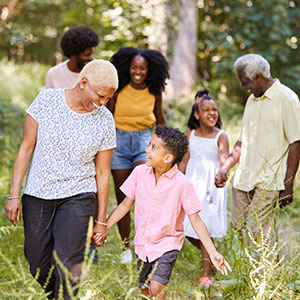Healthy Brain Initiative Collaborative
The Healthy Brain Initiative (HBI) Collaborative is committed to collective solutions for brain health for all of us. Its work addresses cognitive health, especially for underserved populations, as a public health approach to address the Alzheimer's and dementia crisis.
The Healthy Brain Initiative (HBI) Collaborative is a multi-component approach that aims to fully integrate cognitive health into public health practice, reducing the risk and impact of Alzheimer's and other dementia.
Members of the HBI Collaborative use a research and data-driven public health approach to expand collective impact on brain health by:
- Translating the latest science on risk reduction, early detection, and dementia caregiving into public health interventions.
- Increasing public health focus on populations experiencing high burdens of dementia, including people from Black, Hispanic, American Indian and Alaska Native communities and adults with intellectual and developmental disabilities.
- Enhancing state, local and tribal public health capacity and knowledge.

Participating members
The HBI Collaborative is composed of partners funded through cooperative agreements with the Centers of Disease Control and Prevention (CDC) under the National Healthy Brain Initiative (NHBI) and the Building Our Largest Dementia Infrastructure for Alzheimer's Act (BOLD Act). Co-chaired by the CDC's Alzheimer's Disease Program and the Alzheimer's Association, the HBI Collaborative works collectively to promote brain health, address cognitive impairment and better support the needs of caregivers. These are the participating members.
Centers for Disease Control and Prevention (CDC), Alzheimer's Disease Program
The Alzheimer's Disease Program (ADP) at CDC develops evidence-based, scientific information to educate, inform and assist in translating its research into public health practice. ADP co-chairs the HBI Collaborative, oversees and administers the NHBI and BOLD Act federal grants and provides public health leadership on national caregiving and cognitive health partnerships.
Contact: aging@cdc.gov
NHBI Awardee, Component A — Alzheimer's Association
The Alzheimer's Association serves as the backbone support organization for the HBI Collaborative. As the only NHBI Component A awardee, the Alzheimer's Association co-chairs the HBI Collaborative by providing strategic guidance, administrative support, and coordination. A national partner of the NHBI since its inception in 2005, the Alzheimer's Association helps state, local, and tribal public health organizations address the growing Alzheimer's crisis through the joint development and implementation of the HBI Road Map series, enhanced data collection and analysis and training for the current and future public health workforce.
Contact: publichealth@alz.org
NHBI Awardee, Component B — International Association for Indigenous Aging
The International Association for Indigenous Aging (IA2) is a national hub for Alzheimer's disease and related dementias (ADRD) information resources serving Indian Country. As a NHBI Component B awardee, IA2 serves American Indian and Alaska Native communities. IA2 provides training, technical assistance and resources for tribes, tribal leadership, health care and public health staff, Urban Indian Health Centers and organizations and tribal elder services advocates across the country. Learn more at the American Indian and Alaska Native Resource Center for Brain Health.
Contact: admin@iasquared.org
NHBI Awardee, Component B — University of Illinois at Chicago, Health Matters Program
The University of Illinois at Chicago (UIC) National Healthy Brain Initiative for People with Intellectual and Developmental Disabilities seeks to educate and empower people with intellectual and developmental disabilities (IDD) and their support systems about brain health. The UIC NHBI is a partnership between the HealthMatters Program (HMP), National Task Group on Intellectual Disabilities and Dementia Practices (NTG) and the UIC's ENGAGE-IL HRSA Geriatrics Workforce Enhancement Program (GWEP) for education, empowerment, and workforce development across all community sectors (e.g., support professionals, community health providers, public health professionals, healthcare providers and unpaid caregivers). As a NHBI Component B awardee, the UIC HealthMatters Program serves people with IDD across the lifespan — both adults living with and without dementia — and their support systems (including informal and formal caregivers) and other stakeholders.
Contact: bmarks1@uic.edu or jsisirak1@uic.edu
NHBI Awardee, Component B — UsAgainstAlzheimer's, Center for Brain Health Equity
The UsAgainstAlzheimer's Center for Brain Health Equity seeks to educate and mobilize minority-serving health providers, provide culturally-tailored brain health messaging and empower community partners with public health data on brain health inequities. As a NHBI Component B awardee, the Center for Brain Health Equity serves Black and Hispanic communities.
Contact: smonroe@usagainstalzheimers.org
BOLD Public Health Center of Excellence on Dementia Risk Reduction — Alzheimer's Association
The Alzheimer's Association BOLD Public Health Center of Excellence on Dementia Risk Reduction translates the latest science on dementia risk reduction into actionable tools, materials and messaging for public health agencies, works with communities to develop and implement risk reduction strategies and promotes and disseminates public health best practices.
Contact: centerofexcellence@alz.org
BOLD Public Health Center of Excellence on Early Detection of Dementia — New York University
The BOLD Public Health Center of Excellence on Early Detection of Dementia at the New York University (NYU) Grossman School of Medicine is a national resource and driving force for implementing evidence-based and evidence-informed public health strategies to increase the early detection of dementia. The Center is led by a team from the Division of Geriatric Medicine and Palliative Care and the Department of Population Health at NYU Langone Health and from the University of Southern California Keck School of Medicine and aims to increase awareness of dementia as a manageable chronic condition.
Contact: nyuboldcenter@nyulangone.org
BOLD Public Health Center of Excellence on Dementia Caregiving — University of Minnesota
The BOLD Public Health Center Of Excellence for Dementia Caregiving at the University of Minnesota collects, disseminates and develops effective tools, resources and materials on dementia caregiving. In addition, the Center also provides free, individualized technical assistance to public health agencies and serves as a hub for sharing best practices and innovative public health solutions for supporting dementia caregivers.
Contact: phcoe-dc@umn.edu
